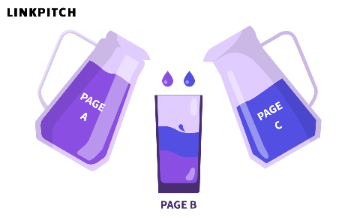Link juice (commonly referred to as link authority, link equity or SEO juice) is a non-technical term that describes the SEO value that a web page gets from another page that has linked to it.
Why is Link Juice Important?
Web pages link to others all the time. Internal links help you guide your visitors through your site, while external links provide your visitors with more information or context about the topics being discussed on a certain page.
Google takes this into account when determining what position a page should rank for a given query. Generally speaking, getting more backlinks should improve the page’s ranking on Google. But, it’s not just a matter of the number of links. It’s about the value of those links, i.e., the link juice. Pages with several, authoritative backlinks tend to rank higher on Google searches. And this means more traffic to your site.
Several factors need to be considered when determining the effect of getting a backlink from another page. The more link juice you can get, the more your site will benefit from a link.
Let’s see how it works.
How is Link Juice Transferred?
Say you have two different pages, A and B.
If A adds a link to B, Page B will receive an SEO boost (or link juice) from Page A. Google’s algorithm will take note of this.
You can think of it as a letter of recommendation or endorsement for a job position. By adding a link to Page B, Page A is telling Google that it trusts Page B and that it adds value to it.
Now let’s say a third page, C, also adds a link to Page B. Link juice will also flow from C to B, and Google will once again analyze the SEO value that should be awarded to page B for this endorsement.

As Page B starts getting more links, the higher it will probably rank on Google. But, as I mentioned before, it’s not just about quantity: it’s more about the amount of link juice being transferred.
How Do You Calculate Link Juice?
As we saw in the previous examples, when a web page links to another page, it passes some of its SEO value onto it. The amount of link juice that is passed on depends on several factors.
Some of these are:
- Authority:
Just like a letter of recommendation from the CEO of a company will have more impact than one from a mid-level manager, the authority of the site that you get a link from will define the amount of link juice that you’re getting.
Links from authoritative sites—that is, sites that Google already trusts—pass more link juice than sites with little authority. Domain Authority (DA) from Moz and Domain Rating (DR) from Ahrefs are two metrics that can give you a sense of a site’s authority.
- Relevance:
The more relevant a link is, the more link juice is being passed on. If you have an article about healthy recipes, a link on a blog about fitness will be more relevant than getting a link from a page that talks about movies.
- Number of links on the page:
Link juice is split equally among all the outgoing links on a page. If your link is on a page that has 100 links, the link juice you’ll get will only be 1% of the total SEO value that the page has to offer.
These factors should not be analyzed individually but rather as a whole. For example, A high DA/DR by itself doesn’t necessarily mean that a site is authoritative. There are plenty of sites that have high DRs but get little to no traffic. Getting a link from such a site will probably not be too valuable.
How Can Your Site Get More Link Juice?
If you want to increase the amount of link juice flowing to your site significantly, you need to grow the amount of high-quality, authoritative, and relevant backlinks pointing to pages on your site.
A good link building strategy can help you achieve this.
Writing content that is in-depth, useful, and relevant to your niche will make the process a lot easier. Remember that the main reason websites use links is to refer its visitors to other pages that can be helpful for them. If your content adds value to other pages, there’s a higher chance that other sites will link to it.
Once you’ve built out this content, you can use different approaches to build links to your site and increase the overall amount of link juice that it’s getting.
Some additional strategies that you can use are:
· Improving your brand’s popularity through advertisement, PR and content promotion efforts.
· Contributing content to other sites (guest posting).
· HARO (Help a reporter out) link building.
Improving Your Site’s SEO by Maximizing Link Juice
Backlinks—and more importantly, backlink quality—can help your site rank higher on Google.
In this article, I’ve talked to you about the concept of link juice and how it can be used to analyze how much your site’s SEO benefits from the links you’re getting.
The tools and strategies that I have laid out here will help you know what to look for when building links for your site and how to evaluate them.
Time to get juicing!

